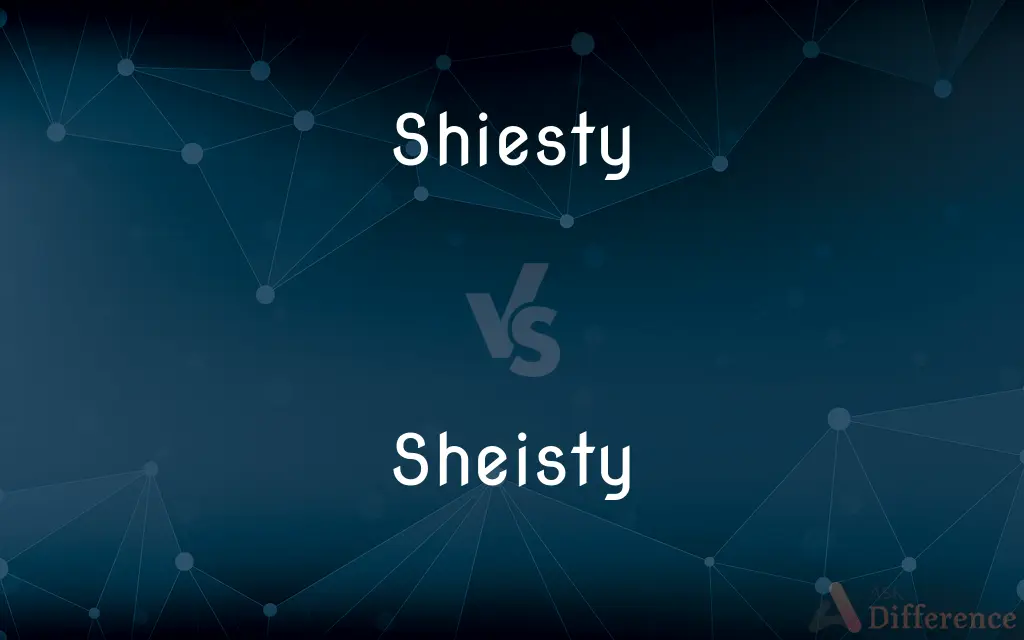Shiesty vs. Sheisty — What's the Difference?
Edited by Tayyaba Rehman — By Fiza Rafique — Updated on April 8, 2024
Shiesty and sheisty are variants of slang, both implying deceitful or untrustworthy behavior, with no difference in meaning.

Difference Between Shiesty and Sheisty
Table of Contents
ADVERTISEMENT
Key Differences
Both "shiesty" and "sheisty" refer to someone deceitful or untrustworthy, often used in informal or slang contexts to describe behavior that is underhanded or suspect. While there is no significant difference in meaning, the variation in spelling reflects a common occurrence in slang, where phonetic spellings can lead to multiple accepted versions of the same term.
In terms of usage, both spellings are found in various dialects of English, especially within American English, and their prevalence can vary based on regional preferences or cultural contexts. Additionally, both terms have seen increased usage in popular culture, especially in music and social media, which has helped to cement their place in contemporary slang.
Despite their informal nature, "shiesty" and "sheisty" are both effective in conveying a specific character judgment, emphasizing the speaker's perception of someone's lack of integrity or honesty.
It's important to note that as slang, these terms should be used with consideration of the audience and context, as their informality and connotations might not be appropriate for all settings.
Comparison Chart
Meaning
Refers to someone deceitful or untrustworthy
Refers to someone deceitful or untrustworthy
ADVERTISEMENT
Usage
Slang for underhanded behavior
Slang for underhanded behavior
Spelling Variation
One variant of the slang term
Another variant of the same slang term
Context
Used informally, particularly in American English
Used informally, particularly in American English
Appropriateness
Best used in casual or cultural contexts
Best used in casual or cultural contexts
Compare with Definitions
Shiesty
Gained popularity in music and online discourse.
That song really highlights how shiesty people can be in the industry.
Sheisty
Used among peers or in casual settings to express mistrust.
It was a sheisty move to take credit for the work he didn't do.
Shiesty
Best suited for informal conversations.
I wouldn’t call him shiesty in a formal complaint, but it fits when venting to a friend.
Sheisty
Has seen varied usage in different regions and demographics.
That actor's sheisty off-screen persona has affected his fan base.
Shiesty
Often used to describe underhanded actions or individuals.
The way he avoided paying was pretty shiesty.
Sheisty
Slang for someone who is deceitful or lacks integrity.
They knew better than to trust her; she was known to be sheisty.
Shiesty
Slang for deceitful or untrustworthy behavior.
After the deal went bad, everyone realized he was shiesty.
Sheisty
Another accepted spelling variation of the same term.
In some discussions, sheisty is the preferred spelling.
Shiesty
Represents one common spelling in slang.
You'll see shiesty spelled that way in most online forums.
Sheisty
To be used with awareness of its informal nature.
Describing someone as sheisty in a social media post can quickly spread.
Shiesty
Misspelling of sheisty
Sheisty
Shifty, untrustworthy
Sheisty
Unscrupulous
Common Curiosities
Can shiesty be used in formal writing?
No, it is best suited for informal contexts due to its slang nature.
Is there a difference between shiesty and sheisty?
No, there is no difference in meaning; they are just spelling variations of the same slang term.
What does shiesty mean?
Shiesty is slang for someone who is deceitful or untrustworthy.
How did shiesty and sheisty become popular?
Their popularity can be attributed to their use in music, social media, and by influencers in popular culture.
Are shiesty and sheisty recognized in dictionaries?
Some modern dictionaries may include them due to their usage in contemporary slang, but they are not universally recognized in formal English.
Can shiesty or sheisty have positive connotations?
Generally, both terms have negative connotations, relating to dishonesty or lack of integrity.
How can I know if using shiesty or sheisty is appropriate?
Consider your audience and setting; these terms are best used among peers in informal settings and might be inappropriate in formal or sensitive situations.
How should I respond if someone calls me shiesty or sheisty?
Context matters; it could be playful among friends or serious if indicating distrust, so respond accordingly.
Can businesses or brands be called shiesty or sheisty?
Yes, in informal discourse, businesses or brands can be labeled as such to criticize their practices or ethics.
Is it offensive to call someone shiesty or sheisty?
It can be seen as offensive, as it implies deceitful or untrustworthy behavior; context and audience are important considerations.
Has the use of shiesty and sheisty evolved over time?
Like all slang, their usage and popularity can evolve, reflecting changes in language, culture, and social attitudes.
In what contexts are shiesty and sheisty most commonly used?
They are most commonly used in informal, casual conversations or in cultural commentary, especially within younger demographics.
Which spelling should I use, shiesty or sheisty?
The choice of spelling can depend on regional preferences or personal style, as there is no standardized form for slang terms.
Do shiesty and sheisty appear in literature?
They may appear in contemporary literature that incorporates slang or informal language to convey character or setting.
Are there similar slang terms to shiesty and sheisty?
Yes, slang terms like "sneaky," "shady," or "dodgy" have similar connotations and are used to describe deceitful behavior.
Share Your Discovery

Previous Comparison
Planing vs. Planning
Next Comparison
Pneumothorax vs. AtelectasisAuthor Spotlight
Written by
Fiza RafiqueFiza Rafique is a skilled content writer at AskDifference.com, where she meticulously refines and enhances written pieces. Drawing from her vast editorial expertise, Fiza ensures clarity, accuracy, and precision in every article. Passionate about language, she continually seeks to elevate the quality of content for readers worldwide.
Edited by
Tayyaba RehmanTayyaba Rehman is a distinguished writer, currently serving as a primary contributor to askdifference.com. As a researcher in semantics and etymology, Tayyaba's passion for the complexity of languages and their distinctions has found a perfect home on the platform. Tayyaba delves into the intricacies of language, distinguishing between commonly confused words and phrases, thereby providing clarity for readers worldwide.
















































